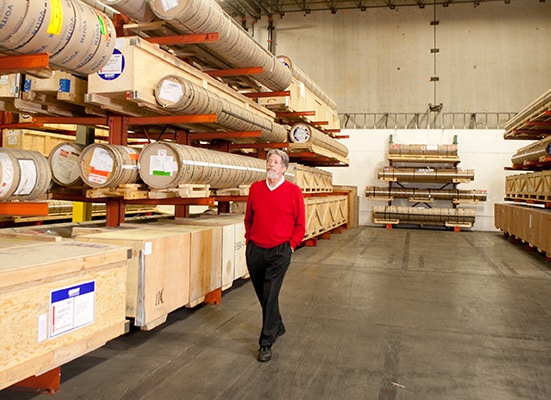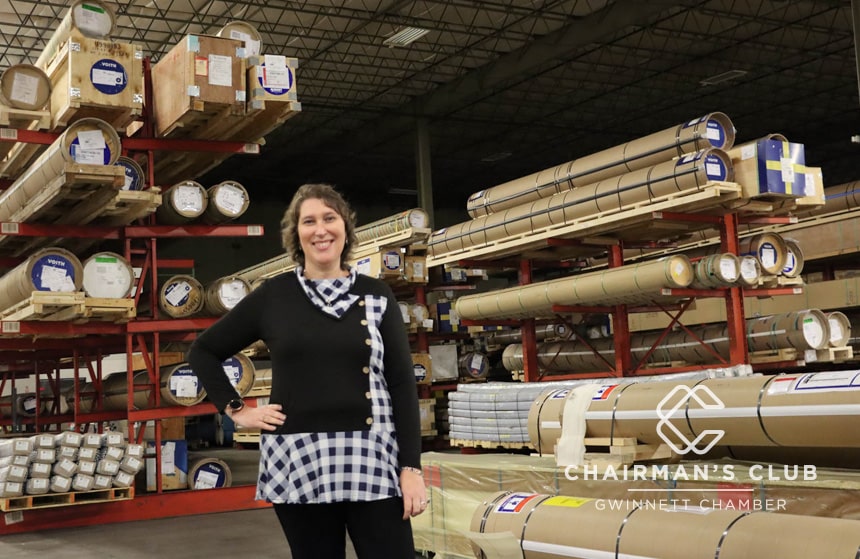The now familiar topic of supply chain issues follows Colleen Japuntich, President of NEMA, Inc., to all her networking events.
“It’s definitely been driving some interesting conversations, but I enjoy it,” she said. “I love talking about our business.”
NEMA is a logistics company specializing in warehousing and domestic and international delivery of paper machine clothing – the fabric on which paper is made at paper mills. Headquartered in Duluth, NEMA is one of the only transportation and logistics companies in the world to specialize in the delivery and storage of paper machine clothing, which is packaged in tubes or crates that can be up to forty-five feet long and thirty inches wide.
NEMA employs its own team of specially trained truck drivers, partners directly with steamliners and facilitates the logistics of importing, exporting, transportation and rush delivery of paper machine clothing throughout the world. Though the company has had few competitors since it was founded in 1988, diversification is becoming a necessity.
“Paper is going to be a continuously shrinking industry as we use less paper and move toward going paperless,” Japuntich said. “We want to be smart and continue to have growth.” As part of these diversification efforts, Japuntich and the NEMA leadership team have started looking for ways that NEMA’s capabilities can help other Gwinnett County businesses.
One of the biggest benefits NEMA can offer any business that imports products is its Foreign Trade Zone Designation. A Foreign Trade Zone – or FTZ – is a location where imports can be stored domestically without paying U.S. Customs duties until the product is needed. According to Japuntich, NEMA is the only FTZ business in Gwinnett County that is not also a manufacturing facility, which means any business can benefit from NEMA’s designated space.
NEMA customers can purchase products in bulk from abroad, have them stored in NEMA’s FTZ warehouses and then release the products piecemeal, paying duties only as the products are released into commerce.
“It allows our customers to buy at higher volume and hopefully get a discount on that product. It also allows them to offset some of that cashflow by not having to pay a huge duty bill all at one time, instead they just pay it as they need the product.” Japuntich said. “The thing we’ve seen, especially with the supply chain issues, is that there are a lot of people waiting for products stuck at port, while our customers’ products are sitting here with us, and they can get them when they need them.”

Neal Baines, NEMA Founder
Japuntich is hoping her involvement in the Gwinnett Chamber Chairman’s Club will help her get the word out about NEMA and continue to build on Neal Baines’ culture of helping people. Baines founded NEMA and recently retired from the company but left a legacy of being there for his employees – whether it was jumping in to drive a trailer for a rush delivery or assisting employees in buying their first house or car.
“I hope that the leadership team and I can continue [Baines’] legacy. But now we want to do it on a bigger scale and not just help our employees but help the community,” Japuntich said. “We want people to know that we’ve got this interesting little business here and, hopefully, we can help you. If we cannot help you with your transportation needs, shipping needs or your storage needs, maybe you can use us as a resource if you are not used to the shipping supply chain. We have a lot of partnerships, so if we can’t offer the right assistance, hopefully we can get you to the right place to get it.”

